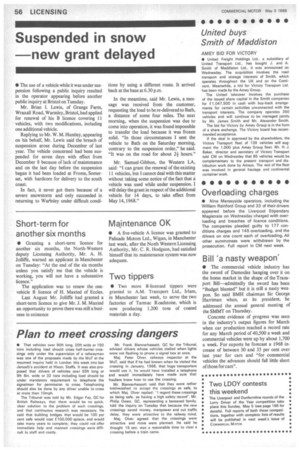Plan to meet crossing dangers
Page 58

If you've noticed an error in this article please click here to report it so we can fix it.
• That vehicles over 90ft long, 20ft wide or 150 tons including load should cross half-barrier crossings only under the supervision of a railwayman was one of the proposals made by the MoT at the resumed inquiry held in London this week into last Januaey's accident at Hixon. Staffs. It was also proposed that drivers of vehicles over 55ft long or 9ft 6in. wide or 32 tons including load should be under mandatory requirement to telephone the signalman for permission to cross. Telephoning should also be done by any driver unable to cross at more than 10mph.
The Tribunal was told by Mr. Edgar Fay, QC for British Railways, that there would be no quick, clear solution to the problem of such crossings, and that continuous research was necessary. He said that building bridges that would be 100 per cent safe would cost £100,000 apiece, and would take many years to complete; they could not offer immediate help and manned crossings were difficult to staff and costly. Mr. Frank Blennerhassett, QC for the Tribunal, advised drivers whose vehicles stalled when lights were not flashing to phone a signal box at once.
Maj. Peter Olver. railways inspector at the MoT. said that if he had known when he visited the crossing in January, 1966, that huge transporters would use it, he would have installed a telephone and would immediately have made sure that hauliers knew how to use the crossing.
Mr. Blennerhassett said that they were rather brainwashed to accept the crossings as safe, to which Maj. Olver replied: "I regard these crossings as being safe, as having a high safety record". Mr. Philip Owen, QC, representing a bereaved family, told the inquiry on Tuesday that because the new crossings saved money, manpower and cut traffic delay, they were attractive to the railway mind.
Maj. Olver agreed that the crossings were attractive and more were planned. He said he thought 19 sec. was a reasonable time to clear a crossing before a train came.




































































































































































































































